In 2014, chef Davide Cerretini advertised a special that would forever change his fate: Anyone who left his restaurant a 1-star review on Yelp would get 25% off a pizza.

See, his Bay Area-based Italian joint, Botto Bistro, was at a crossroads. Like many small businesses, it was enslaved to the whims of online reviewers, whose public dispatches could make or break its reputation.
He’d had enough: It was time to pry the stars from the “cold, grubby hands of Yelpers” and take control of his own destiny.
But the move would set Cerretini at the center of a long-standing battle between Yelp and disgruntled business owners — a battle including cries of “extortion,” review manipulation, and predatory advertising tactics.
A young chef’s journey
Born to vineyard operators in Collemontanino, Italy, Cerretini enjoyed a childhood of culinary delights — home-cooked meals, pure ingredients, and simple cuisine.
In the mid-’90s, he immigrated to America to try his hand in the restaurant trade.
After years toiling in backroom kitchens, he went in with a partner and opened his first restaurant, Cacciucco Cucina Toscana, in Sausalito, California. With his gregarious personality and “Italian charm,” Cerretini became a staple of the community and established strong ties with loyal customers. Business was booming.

Then, the recession hit.
By the end of 2008, Cerretini lost everything and was forced to sell off his restaurant for a small sum of cash. “I thought everything was over,” he says. “Then, I found this little place in Richmond, California.”
The new location was everything he wanted: It was cheap, close to his loyal customers, and, best of all, unpretentious. He called it Botto Bistro.
Botto goes digital
As a restaurateur, Cerretini had been an early adopter of Yelp.
Launched in 2004 by former PayPal employee Jeremy Stoppelman, the platform’s user-submitted 5-star rating system quickly became an integral part of every small business’s online footprint. As Cerretini knew, a mere half-star difference in a restaurant’s rating could increase peak-hours foot traffic by as much as 19%.
By the time Botto Bistro opened its doors in 2009, Yelp boasted some 26m unique visitors per month. And whether intentionally or not, the platform had entrenched itself as the controller of every small business’s online reputation — and fate.
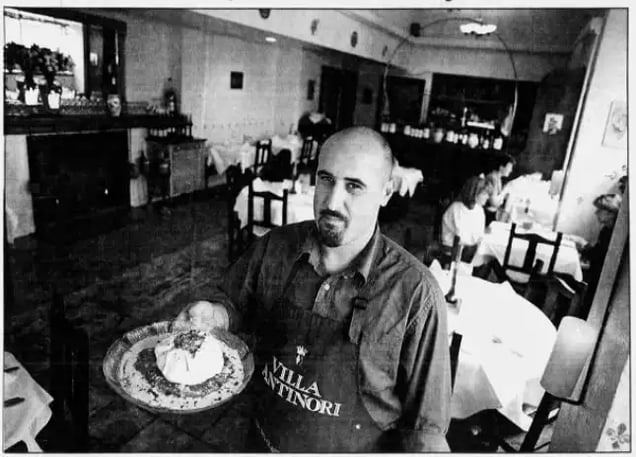
In the months after Botto Bistro’s grand opening, Cerretini began receiving dozens of calls from Yelp salespeople, who implored him to buy ads.
According to Cerretini, when he rebuffed these offers, he’d often notice that freshly posted 5-star reviews would be removed from his page — often no less than 24 hours after getting off the phone with a Yelp rep.
“I came from Italy, and know exactly what mafia extortion looks like,” he says. “Yelp was manipulating reviews and hoping I would pay a protection fee. I didn’t come to America and work for 25 years to be extorted by some idiot in Silicon Valley.”
Faced with undulating star ratings, Cerretini resulted to a devious measure.
“I wrote myself 5-star reviews,” he admits. “I wasn’t a good guy. I was writing fake ones to replace the real ones they removed.”
Documented records shared with The Hustle by a Yelp spokesperson tell a fuller story of Cerretini’s actions.
Under the alias “Babghanoush I,” Cerretini posted 13 fake positive reviews for Botto Bistro, as well as fake critical reviews of neighboring restaurants — sometimes going so far as to disparage fellow owners.
Yelp rebuffed Cerretini’s extortion claims, instead attributing the removal of positive Botto Bistro reviews to the platform’s algorithm, which routinely filters reviews based on a number of criteria (which are not public). These “filtered” reviews are still visible to customers, but do not factor into a business’s overall star rating.
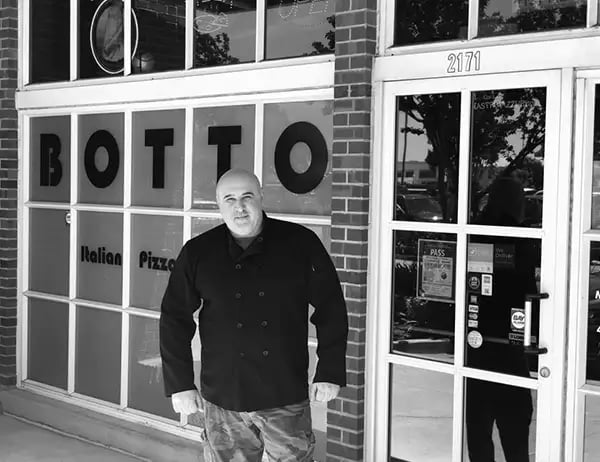
Eventually, Cerretini relented, plunking down $270 per month to advertise his business on Yelp. But after 6 months, he found the service “useless” and cancelled it. Once again, his star rating plummeted.
In the spring of 2014, after turning down another Yelp salesperson, Cerretini claims that four 5-star reviews were filtered from his page, and three 1-star reviews were suddenly catapulted to the top of the page. For the chef, this was the final straw.
“Those 1-star reviews were from people who never even set foot in my restaurant,” says Cerretini. “One complained about our waiters… we didn’t even have waiters!”
Cerretini began to realize that Yelp was “completely controlling [his] reputation.” And after mulling things over, he decided it was time for more extreme measures.
Good meal? Leave us 1 star on Yelp!
At the time, Cerretini had a reputation for being snarky.
In the vein of Edsel Ford Fong (who gained a reputation in 1960s San Francisco for being the ‘World’s Rudest Waiter’), his sassy attitude with diners was part of his appeal.
He maintained a Hall of Shame featuring facetious Yelp Eliters (or “Village Idiots”). He compiled idiotic customer inquiries (e.g. “Do you sell burgers?”) and sent out a newsletter of the “Stupidest Questions of the Month.” He posted an FAQ on his website stating that the customer is not, in fact, always right.
To loyal diners, it was Davide being Davide; to transient Yelpers, it was 1-star service.
Soon, he came to a realization: “What if I don’t give a shit about reputation? What if I take away their power by actually making it worse?”
One morning in September of 2014, he placed a simple sign in front of Botto Bistro: Give us a one star review on Yelp and get 25% off any pizza! Hate us on Yelp. (The discount was later increased to 50%.)
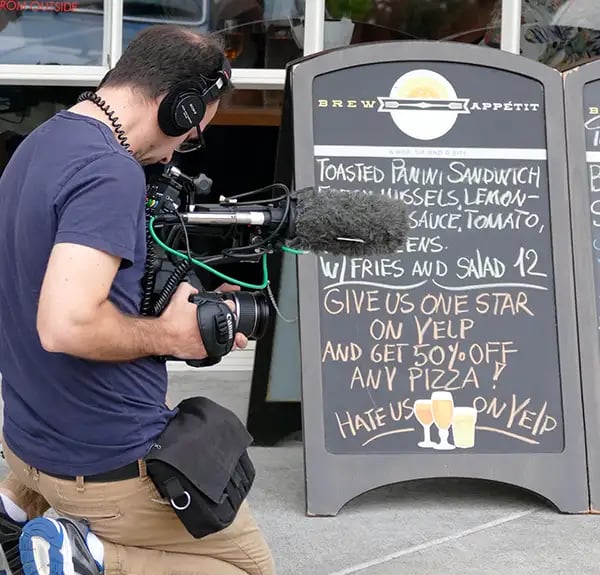
“I knew the people at Yelp were going to hate me, but that’s exactly what I wanted,” says Cerretini. “I didn’t want them in there anyway.”
His protest came at a perfect time. Days earlier, the 9th U.S. Circuit Court of Appeals had ruled that Yelp had the right to manipulate reviews, and its advertising tactics were a form of “hard bargaining” — not extortion.
Small business owners were furious, and they were looking for a vigilante hero.
“Delicious food priced fairly. One star.”
The next morning, Cerretini pulled into his parking lot and was greeted by an “avalanche” of journalists, fellow restaurant owners, and supporters. They all wanted to know the same thing: How did it feel to just… not care about reviews?
That Friday, Cerretini did more business than he typically did in an entire month.
“I had to ask the restaurant community for help, extra pizza dough,” he laughs. “It was an absolute madhouse. I’d never seen anything like it.”
Most supporters refused to take the discount, but were thrilled to write a review and partake in what they deemed to be a grassroots, anti-Yelp uprising.
In a few days’ time, Botto Bistro’s Yelp page attracted more than 2,300 1-star ratings (95% of its total reviews) extolling the good food, proper service, and rustic ambiance. “Botto Bistro sucks,” wrote one reviewer. “Delicious food priced fairly. One star.”
This earned the restaurant the distinction of being the worst-rated restaurant on Yelp.
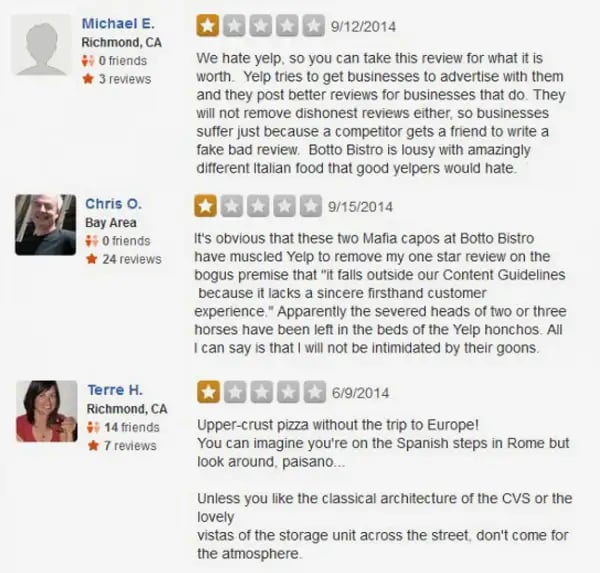
“I got thousands and thousands of letters, thousands of emails a day,” says Cerretini. “People were sending me boxes of chocolates, cash, checks. Business owners from all over the country stopped by to thank me and write a bad review.”
Yelp was none too pleased about Cerretini’s newfound fame.
The chef soon received a threatening email from a member of Yelp support, claiming he was exchanging reviews for “incentives” (a discount on pizza) — a clear violation of the platform’s Terms of Service.
Cerretini replied with mocking language, then posted both emails publically on social media, further stoking his followers’ Yelp hatred.
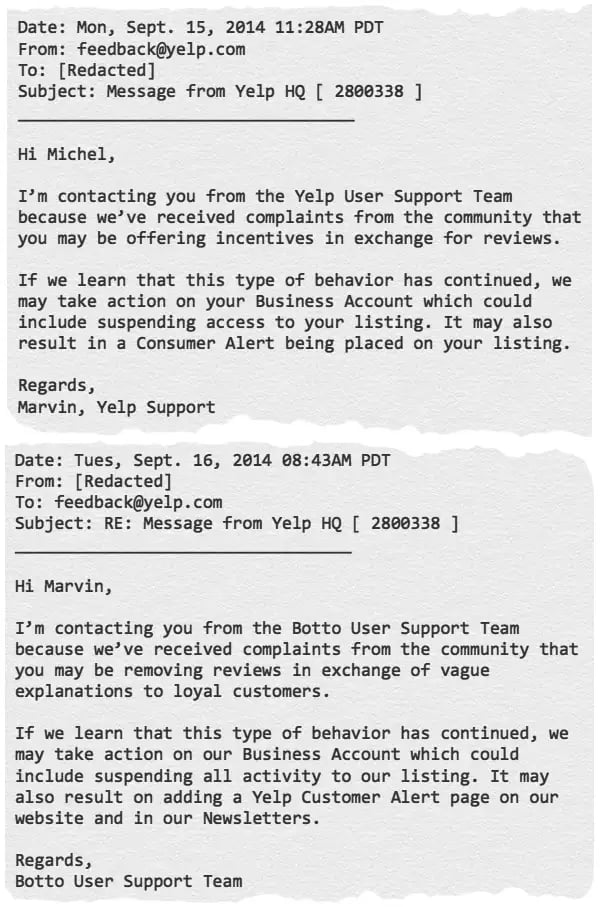
As the press continued, Cerretini positioned himself as an anti-Yelp spokesman.
“It wasn’t about the discount, or the pizza, or even the reviews,” he says. “It was about the general public saying enough is enough. They no longer wanted to be surrounded by Yelpers’ bullshit.”
The uprising
Cerretini wasn’t the only one to act on this sentiment.
In isolated bids to circumvent the “oppression” of online reviews, business owners have plunked “NO YELPERS” signs in their windows, shamed rude reviewers on Instagram, and launched anti-Yelp websites.
Dan Neves, a waiter at a fine dining establishment in Austin, Texas, created YELP BULLIES EXPOSED, a private Facebook group that tracks down rude Yelpers and sends them a one-pound bag of animal feces procured from poopsenders.com. In a little over a month, the group has attracted 278 members.
“I’ve had friends get fired over bad Yelp reviews, even if the review was untrue,” says Neves. “If you cost someone her job, the least I can do is send you a pound of shit… elephant shit, rhino shit, dog shit — any other type of shit I can get my hands on.”
While business owners say Yelp is a “Mafia” that extorts them by manipulating star ratings, Yelp brushes this off a “conspiracy theory” trotted out by “fringe commentators.”
This saga played out publicly a few weeks ago, with the release of Billion Dollar Bully, a long-anticipated documentary about this alleged extortion. In response to the film, Yelp purchased billiondollarbully.com and directed it to a landing page (yelp.com/extortion) categorically dispelling the claims.
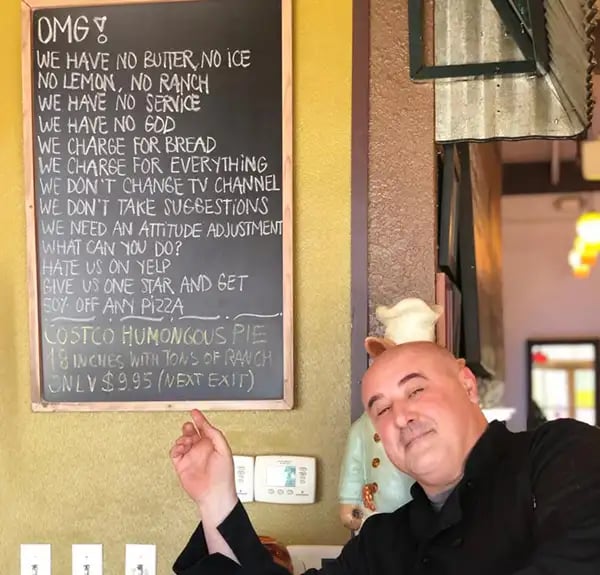
A Yelp spokesperson we spoke with says the extortion claims are really just a “misconception” about how Yelp’s recommendation software works. To back up this claim, the company often notes that every class-action lawsuit and FTC investigation against them has been ruled in their favor or dropped.
The truth is likely somewhere in the middle. Yelp is undeniably aggressive in its sales tactics (according to earnings reports, 85% of its ad revenue comes from small businesses) and reviews on the platform do, indeed, frequently fluctuate.
But despite legions of anecdotal evidence from business owners, the linkage between these two things ultimately can’t be proven without transparency around Yelp’s filtering algorithm.
The 1-star chef
Today, Cerretini has forged a career out of his 1-star publicity: He does private cooking classes and events that run up to $3,000 a pop.
In the aftermath of his press, he’s become a celebrity in the restaurant scene — a Davide who went up against a tech Goliath and emerged self-empowered.
“I’m the only person who beat them at their own game,” he says. “I left a black mark on that company. I trolled them. I humiliated them. And now, they avoid me like the plague.”
Yelp says that Cerretini is giving himself too much credit. Botto Bistro is an atomic particle in an ecosystem that contains 185m reviews. A member of the company called the act of defiance a publicity stunt that had a negligible impact on the platform’s operations.
But the chef still enjoys immunity: On occasion, he’ll screw around by changing his listed business hours, or renaming Botto Bistro “The Worst Chinese Food in the World.”
“Most people are not ready to stop caring about reviews — it’s a big risk,” he says. “But I’d rather sit alone in my restaurant then get business from Yelpers.”
